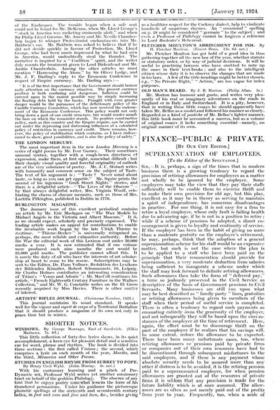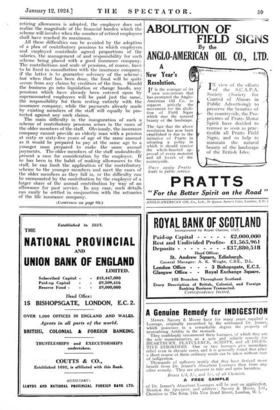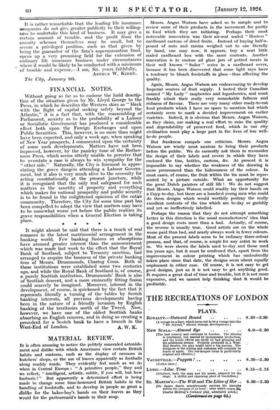FINANCE-PUBLIC & PRIVATE.
[By OUR CITY EDITOR.]
SUPERANNUATION OF EMPLOYEES.
[To the Editor of the SPECTATOR.] SIR,—It is, perhaps, a sign of the times that in modern business there is a growing tendency to regard the provision of retiring allowances for employees as a matter not wholly to be ignored by the employer. Some employers may take the view that they pay their staffs sufficiently well to enable them to, exercise thrift and to make their own provision for old age, but this plan, excellent as it may be in theory as serving to maintain a spirit of independence, has numerous disadvantages in practice. For one thing, it is not easy for a firm to retire a loyal employee, whose only fault is failing health due to advancing age, if he is not in a position to retire ; while if a scheme of pensions be adopted, a direct en- couragement is given to loyalty and continuity of service. If the employer has been in the habit of giving no more than a moderate gratuity on the employee's retirement, he may, perhaps, think that the adoption of a general superannuation scheme for his staff would be an expensive matter, but such is not the case where the plan is to be applied to a staff who have been paid on the principle that their remuneration should provide fOr superannuation, A very moderate deduction from'salaries being sufficient to inaugurate a scheme under which the staff may look forward to definite retiring allowances. Such allowances then take the form of "deferred pay," a term so jealously preserved in the Civil Service as descriptive of the basis of Government pensions to Civil Servants. Many businesses arc still run upon what may be best described as "family party" lines gratuities or retiring allowances being given to members of the staff when their period of useful service is completed.
• There is often a tendency to regard such payments as emanating entirely from the generosity of the employer, and not infrequently' they will be based upon the circt m- stances of the employee at the time of retirement. Here, :again, the effect must be to discourage thrift on the part of the employee if he realizes that his savings will, to some extent, reduce the allowance to be expected. There have been many unfortunate cases, too, where • retiring allowances or pensions paid by private firms " or companies out of their own resources have had te be discontinued through subsequent misfortunes to the said employers, and if there is any payment whose absolute security needs to be assured more than any other if distress is to be avoided, it is the retiring pension paid to a superannuated employee, for when pension allowances are granted out of the resources of private
firms it is seldom that any provision is made for the
(future liability which is at once assumed. The allow- ances are as often as not merely paid out of the profitp from year to year. Frequently, -too, when a scale of retiring allowances is adopted, the employer does not realize the magnitude of the financial burden which the . scheme will involve when the number of retired employees shall have reached its maximum.
All these difficulties can be avoided by the adoption of a plan of contributory pensions to which employers and employed contribute agreed proportions of the salaries, the management of and responsibility for such scheme being placed with a good insurance company. The contributions and scale of pensions, of course, have to be fixed in consultation with the insurance company, if the latter is to guarantee solvency of the scheme ; but when that has been done, the fund will be quite secure from any claims by creditors of the firm. • Should the business go into liquidation or change hands, any pensions which have already been entered upon by superannuated employees will be paid just the same, the responsibility for them resting entirely with the insurance company, while the payments already made by existing members of the staff will equally be 'pro- tected against any such claims. The main difficulty in the inauguration of such a scheme of contributory pensions arises in the cases of the older members of the staff. Obviously, the insurance company cannot provide an elderly man with a pension at sixty or sixty-five years of age of the same amount as it would be prepared to pay at the same age to a younger man prepared to make the same annual payments. The older members of the staff undoubtedly present a case for consideration by the employer. If he has been in the habit of making allowances to the staff, he can limit the, application of the contributory scheme to the younger members and meet the cases of the older members as they fall in, or the difficulty can be strinounted by the contribution by the employer- of a larger share of the annual contribution by way of an allowance for past service. In any case, such details can easily be settled in conjunction with the actuaries of the life insurance company.
(Continued on page GO.). It is rather remarkable that the leading life insurance companies do not give greater publicity to their willing- ness to undertake this kind of business. It may give a certain amount of trouble, and the profit from the annuity schemes themselves may be small, but to secure a privileged position, such as that given by being the guarantor of the firm's superannuation fund, opens up a very promising field for the extension of ordinary life insurance businei,e3 under circumstances where it would be likely to be conducted with a minimum of trouble and expense.—I am, Sir, yours faithfully, ARTHUR W. KIDDY.
The City, January 9th. The City, January 9th.








































 Previous page
Previous page